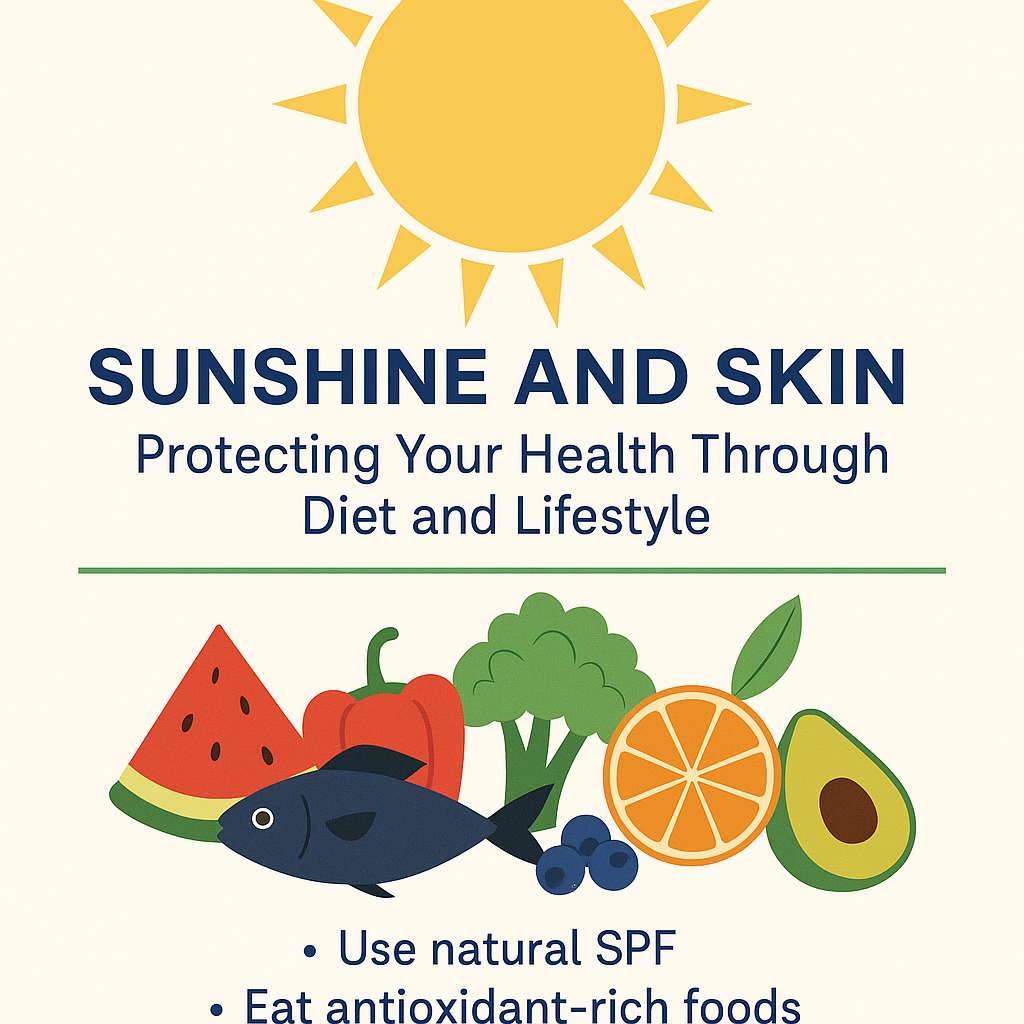Sunshine and Skin: Protecting Your Health Through Diet and Lifestyle
May is Skin Cancer Awareness Month—an essential reminder of how lifestyle, including our daily diet, can influence skin health and long-term wellbeing. While sunshine has many benefits—vitamin D production, improved mood, and better sleep cycles—it also carries risks. In the UK alone, skin cancer is one of the most common cancers, with melanoma cases steadily rising each year.
But did you know that what you put on your plate is just as vital as what you put on your skin? Let’s explore how nutrition and lifestyle—especially when inspired by the world’s healthiest Blue Zones—can help protect your skin and reduce your risk.
Understanding Skin Cancer
Skin cancer typically develops due to overexposure to ultraviolet (UV) radiation from the sun or sunbeds. There are two main types: non-melanoma (which includes basal cell carcinoma and squamous cell carcinoma) and melanoma, the more aggressive form. While genetics and skin type play a role, lifestyle choices such as sun protection, stress management, and diet are powerful modifiers.
The Diet–Skin Cancer Connection
Many are surprised to learn that certain foods have protective properties that can enhance your skin’s natural defences against UV radiation and inflammation.
1. Antioxidant-Rich Foods
Blueberries, spinach, sweet potatoes, tomatoes, and bell peppers are bursting with antioxidants like vitamin C, lycopene, and beta-carotene. These help neutralise free radicals caused by sun exposure.
2. Omega-3 Fatty Acids
Found in oily fish (like salmon and sardines), flaxseeds, and walnuts, omega-3s have powerful anti-inflammatory properties, which may help protect skin cells from damage.
3. Polyphenols and Flavonoids
Green tea, dark chocolate (in moderation), and brightly coloured fruits such as oranges and cherries are rich in compounds that help repair DNA damage and reduce inflammation.
4. Hydrating Whole Foods
Cucumbers, celery, and watermelon aren’t just refreshing—they’re rich in water and help keep the skin hydrated and resilient to sun exposure.
5. Avoid Processed Sugars and Trans Fats
A high-sugar, highly processed diet increases inflammation, weakens the immune system, and can accelerate skin ageing—making the skin more vulnerable to UV damage.
Lifestyle Wisdom from the Blue Zones
In regions like Ikaria (Greece), Okinawa (Japan), Nicoya (Costa Rica), Loma Linda (California), and Sardinia (Italy)—the Blue Zones—people not only live longer but also suffer less from chronic diseases, including cancer. Their longevity secrets include:
- Plant-rich diets with minimal processed foods
- Time outdoors, but with shade, hats, and midday rest to avoid strong sun
- Low stress levels and strong social connections
- Daily movement and mindful living
These habits not only benefit general health but also support skin integrity and resilience.
Simple Tips to Help Prevent Skin Cancer
- Use natural, non-toxic SPF daily—even in the UK!
- Wear protective clothing, sunglasses, and hats when in direct sunlight
- Avoid sunbeds completely
- Consume skin-loving foods daily
- Stay hydrated and limit alcohol
- Prioritise sleep and stress management, as cortisol affects skin healing
When to Seek Help
It’s crucial to keep an eye on any changes in moles or skin patches. The ABCDE rule (Asymmetry, Border, Colour, Diameter, Evolving) is a helpful guide. If you notice any suspicious changes, contact your GP or dermatologist without delay.
Final Thoughts
Sunshine is a beautiful thing—but like all good things, it requires balance. By combining smart sun habits with an anti-inflammatory, nutrient-rich diet, you’re not only supporting your skin but your overall health.
This Skin Cancer Awareness Month, why not make one small change—like adding a handful of berries to your breakfast or switching to a natural sunscreen? Your future self (and your skin) will thank you.
If you’d like personalised nutrition advice to improve your skin health or protect yourself against inflammation and chronic disease, feel free to get in touch.
Written by Milvia Pili (FNTP)
Registered Nutritional Therapist | Blue Zone Nutrition




